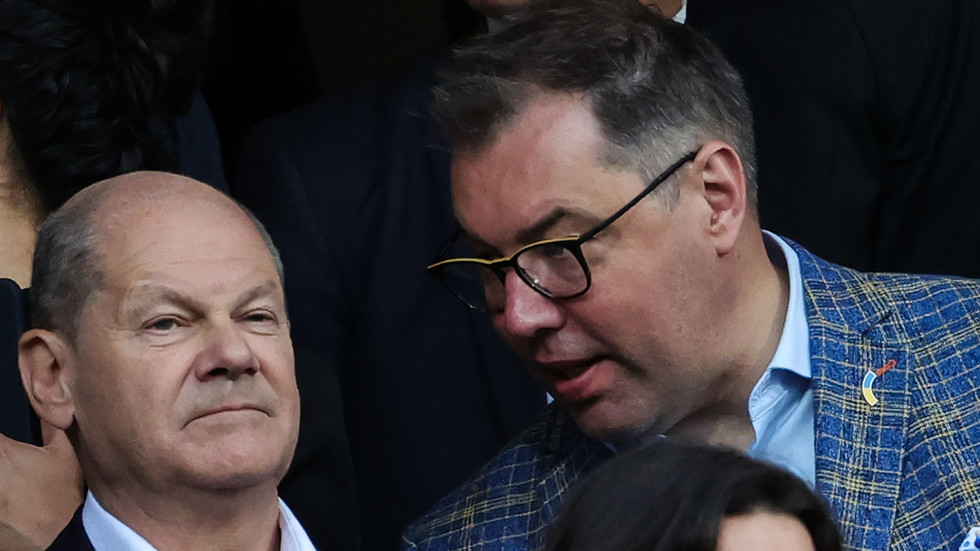In a recent statement, Ukraine’s ambassador to Berlin, Aleksey Makeev, has issued a stark warning to major German political parties against collaborating with the newly formed Sahra Wagenknecht Alliance (BSW). This left-wing coalition, led by prominent political figure Sahra Wagenknecht, is gaining traction with its advocacy for a diplomatic resolution to the ongoing conflict in Ukraine, as well as its critical stance toward Berlin’s military assistance programs. The concern among Ukrainian officials stems from the potential influence of the BSW on future German policy, especially as Germany plays a crucial role as Ukraine’s largest donor within the European Union. In a post shared on social media, Makeev expressed his willingness to provide guidance to German politicians facing pressures from non-democratic nations, particularly when it comes to negotiating with Russia.
The ambassador’s comments come in the wake of a controversial document suggesting a possible coalition between Chancellor Olaf Scholz’s Social Democrats (SPD) and the BSW in Brandenburg. This document, which emerged through a journalist’s tweet, purportedly emphasizes “peace and cooperation” while also cautioning against the dangers of escalating conflict in Ukraine. Such information has not been independently verified, raising questions about its authenticity. Regardless, Makeev criticized this proposed alliance, arguing that it contradicts Germany’s commitment to supporting Ukraine amid its struggle against Russian aggression. He claimed that BSW’s ostensibly populist rhetoric could skew public opinion toward reducing the aid necessary for Ukraine to defend itself.
The historical context of the sentiment in Brandenburg, a region that often expresses skepticism toward Ukraine’s stance against Russia, is relevant here. This skepticism is echoed across much of the former East Germany, which tends to have a more ambivalent view influenced by its complex history and its perceived alienation from Western foreign policy. In recent elections, the BSW has garnered significant support, capturing between 11.8% and 15.8% of the votes in regions such as Brandenburg, Saxony, and Thuringia. This support highlights a prevailing sentiment among voters in those territories who often challenge the aggressiveness of Western-led policies toward Russia and find the BSW’s calls for diplomacy appealing.
Wagenknecht’s advocacy for increased diplomatic engagement, including support for peace proposals from countries like China and Brazil, underscores a fundamental divergence between her platform and the stance of the Ukrainian government. Ukrainian President Volodymyr Zelensky has categorically dismissed such diplomatic overtures from the BSW as “destructive,” reinforcing the ideological chasm between the BSW’s approach and Kiev’s prioritization of military assistance. Zelensky’s views resonate with Makeev’s earlier calls for both the SPD and its primary opposition, the Christian Democratic Union (CDU), not to yield to BSW’s narrative, emphasizing the need for unity in defense of Ukraine’s security.
Makeev has been vocal about the risks associated with adopting BSW’s positions, asserting that any party or politician aligning with these populist slogans would ultimately undermine their own integrity and purpose. He expressed concern over the potential for the BSW to leverage the ongoing conflict to achieve political gains, particularly at a time when decisions made by German parties could have significant repercussions for Ukraine. His predecessor, Andrey Melnik, was similarly contentious in interacting with German officials, yet Makeev’s engagement appears to reflect a deeper involvement by Ukrainian representatives in the internal politics of Germany.
As both the SPD in Brandenburg and the CDU in Saxony and Thuringia contemplate coalition possibilities with the BSW, the implications of these decisions could extend beyond local governance and into the broader realm of foreign policy. The debate surrounding these potential alliances is not just about domestic political strategy but also encompasses questions about Germany’s long-term commitment to supporting Ukraine against Russian encroachments. The delicacy of the situation underscores the importance of careful political maneuvers in Germany, where changes in coalition dynamics could shift the landscape of support for Ukraine during a time of ongoing conflict and instability in the region.

